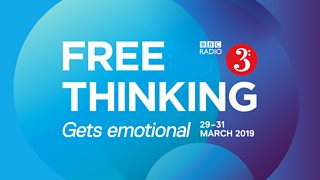Does your pet love you?
Nearly half of UK adults own a pet, , with cats and dogs our most popular choices. Nearly a quarter of us have a dog that goes crazy every time we enter the room, its tail a blur of wagging. And exactly a quarter own at least one cat that may or may not (depending on a number of unknown factors) permit us a quick stroke, before collapsing into a purring puddle of fur on our laps.
We know that we love our pets. But do they love us back? Eleanor Rosamund Barraclough is joined by three animal behaviour experts to explore the emotional similarities and differences between humans and animals. Here’s what we learned from their fascinating discussion at the Free Thinking Festival.
Free Thinking Festival 2019
Does your pet love you? The short answer may be yes – if it’s a dog
It’s difficult enough to decide what love means between humans, let alone between animals or between humans and animals. But if we define “love” as a profound sense of emotional attachment, then Prof Kim Bard, an expert in comparative developmental pyschology from the University of Portsmouth, has some good news for dog lovers.

"We have a few studies now that actually show, scientifically, with good experimentation, that dogs will respond with empathetic concern when their owner – but not a stranger – pretends to cry,” she says. “Not every dog, but more than you'd expect by chance alone. So that feeling that you have that your dog may [respond to you emotionally] is clearly supported by at least some research."
Cats may share some of this empathic ability, – although as most cat owners will know, the ways in which cats respond to this emotional knowledge are much less clear-cut.
But do animals really feel ‘love’ like we do?
Given that we’ll never be able to tune into animals’ thoughts or experience the world as they do, how can we know whether pets are motivated by “love” or by habit, instinct, greed or other factors that we don’t understand?
When we say that our pets love us, there’s a good chance that we’re simply projecting our own feelings onto them. Does your dog love you, or does it just enjoy feeling part of your pack? Does your cat love you, or it is just tolerating you as a reliable supplier of processed meat?

Pets may not understand that they are your pet, let alone your friend
The Renaissance philosopher Michel de Montaigne wrote: “When I am playing with my cat, how do I know that she is not playing with me?” Do animals interpret our owner-pet relationships in the same way we do? It seems unlikely.
Humans are the only species on earth to keep pets. Wild animals frequently live side by side with other species, often interacting with each other in mutually beneficial ways – and there are plenty of examples of playful behaviour between species.
But can you think of a situation where an animal would consciously provide food, shelter and affection to another animal of a different species for the duration of its life – and for no return, save for the joy of interacting with them?
The idea of having pets is also pretty new for humans
Make no mistake: humans have kept beloved animals close at hand for thousands of years. Many of our ancestors clearly expected to continue interacting with animals in the afterlife – think of the Ancient Egyptians, who mummified cat-deities alongside their Pharaohs, or the young warrior buried with his horse at Sutton Hoo.
But having close, emotional relationships with non-working animals is a relatively new idea. While domestic animals have been valued throughout history and often lived in close proximity to humans, they weren’t regarded as furry friends to the same extent they are today.
According to Strathclyde University’s Prof Erica Fudge, the English word “pet” was originally bound up with livestock, particularly cattle (a term that in the 16th Century encompassed cows, pigs and sheep). The “pet lamb” was the animal taken from its mother to live in the house – pets, therefore, were just animals out of their usual places.
It’s all about equality
Our ancestors would have struggled with the idea of loving a pet because animals were seen as inferior to humans. Renaissance thinkers held that friendship could only be between equals – and since animals were inferior, it would be irrational to claim a friendship with one of them.
That’s not to say that our forebears didn’t form close relationships with their animals. Late 16th- and early 17th-Century wills often named individual animals, but these were nearly always cattle (the only animals that could legally be owned) and were of financial rather than sentimental value. Pets, meanwhile, were designated as being for pleasure only; they had no legal status.

16h-Century tips for dancing with your cow
An old dairying manual reveals insights into our ancestors' relationships with livestock.
The sort of animals that relate emotionally to humans aren’t always the ones you might expect
So far, we’ve covered cats, dogs and cows. But when it comes to understanding how animals relate emotionally to humans, there are other animals we can look to for clues – birds, for example.
Prof Nicky Clayton from the University of Cambridge is an expert on corvids, a family that includes birds like crows, rooks, ravens, magpies and jays. Corvids have large brains relative to their body size and posses highly developed social skills. Prof Clayton’s research has demonstrated that crows can both steal and hide food from each other, that rooks can work together to get food out of bins, and that male jays can learn what females like to eat and then present it to them in order to impress them.
And when it comes to corvids’ relationships with humans, could there be something there too? Prof Clayton herself receives regular gifts from the crows she feeds. Meanwhile, a little girl in Seattle has been given hundreds of gifts by crows, including a lens cap that her mother had lost a few weeks before.
“A present for a present” may be quite a human-centric way of looking at it, but it does suggest that dogs and cats aren’t the only animals capable of reciprocating an act of generosity.
Hear more from the Free Thinking Festival's fascinating panel discussion on ±«Óãtv Sounds.
-
![]()
Does my pet love me?
Do dogs empathise with their owners? Can a crow plan for the future? The Free Thinking Festival explores the emotional similarities and differences between humans and animals.
-
![]()
Free Thinking Festival 2019
Browse all the lectures, panel discussions and articles from this year's event on the theme of Emotion.
-
![]()
Seven emotions that no longer exist
Can these historical emotions help us understand how we feel today?
-
![]()
Healthy eating - Edwardian style
Elsa Richardson uncovers the early history of the well-being industry.




